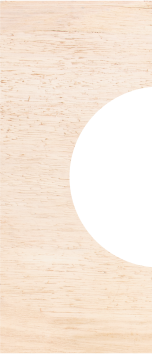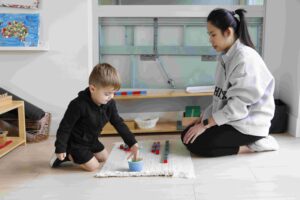Your child’s education is one of the most important decisions you will ever make. The journey of finding a new school for your child, whilst amazing and beneficial, can be highly emotional and confusing. Navigating such questions as ‘What is a good age to start Childcare?’ and ‘the differences between Daycare and Childcare’ along with natural worries can be both perplexing and tiresome. We want you to feel involved every step of the way from their very first day to activities you can also join in with.
We understand that your child’s happiness is what is most important to you- together we can make their educational experience a memorable and fun one.
What is a good age to start Childcare?
Based on research and studies a good age to start Childcare is 2 years old.
Studies show that Toddlers and babies have similar needs when it comes to Childcare. Although, it is highly important to ensure their social development is met, research has shown that babies thrive in a single caregiver environment. The first year Research regarding Maternal depression, infant attachment security and the mental health for babies indicates that in the first year of their life babies are strongly attached to you, need your reassurance and may get upset or uncomfortable around people they do not know.
1-2 years old A child will begin to develop self-regulation and will start understanding other people’s feelings, although they will still look to you for reassurance and may get upset if you are not around.
2-3 years A child will start to build healthy relationships, supportive relationships & develop skills that strengthen their foundations of resilience. They will start interacting more with others, learn about sharing and taking turns and enjoy being around people other than their parent or carers,
Toddlers require stimulation, patience and energy and thrive in an active, social environment with their peers. During your child’s developmental stage, they are starting to both understand, navigate and test the world around them and comprehend where they fit within it. Childcare can be crucial for their mental, environmental and social development, as they start to grow their character, self-esteem and self-awareness.
Like all decisions you make concerning your child; timing, the needs of your child and your unique circumstances play a big role in helping you make the right, informed choice that works for you.
Two main aspects to making this decision is understanding the importance of the continuity of care and the social needs of your child throughout their development.
What is continuity of care?
“Continuity of care promotes the importance of meaningful and deep relationships and quality learning experiences by allowing your child to remain in the same environment with the same group of peers and Childcare staff for a minimum of two to three years” (McMullen, 2018).
At Kynd Montessori, we use a 5:1 ratio of Montessori educators to toddlers and 10:1 for preschoolers so that your child can have personalised, individualistic learning and receive the attention they deserve.
Our education materials and curriculum encourage both active, explorative and inquisitive learning, allowing them to engage in activities they may not have access to at home and instil confidence at an early age.
What is the difference between Daycare and Childcare?
One of the most predominant differences between Daycare and Childcare, is that Daycare centres do not provide kindergarten and preschool programs. Whereas Childcare centres employ qualified, Childcare educators that both specialise and prioritise in implementing these valuable learning opportunities within the curriculum.
The words “Daycare” and “Childcare” is often used interchangeably for the average Australian, but it is important to understand the significant differences and distinction between them, when choosing the right Childcare for you and your child and understanding what they both offer.
Access to Kindergarten and Preschool Programs
As mentioned above, the best time for a child to start their learning journey is around toddler age, which not only prepares them for social independence and to become more school-ready, but also helps build both confidence and self-esteem. Not only is peer interaction encouraged but so is building friendships and new experiences.
At Kynd Montessori Preschool , our caring team respect the needs of every child, ensuring they feel safe, secure and valued within our personalised learning environment. As teamwork is a vital skill for life, we embrace inclusivity and interactivity. We also encourage children to be caring in their social interactions with peers, within both indoor and outdoor play.
Outdoor Play
Not only is outdoor play beneficial for the physical health of a child but also the emotional and mental wellbeing. Childcare centres actively encouraged outdoor play and engagement and typically offer more outdoor space than Daycare centres.
At Kynd, outdoor play is emphasised and embedded within our programs and curriculum. We believe it is important for a child to interact with nature and enjoy the explorations of the outdoors through outside activities. All through a caring and safe environment.
Childcare ratio, staff retention and personalised learning
One of the utmost important parts of a child’s learning is ensuring they feel both valued, appreciated and listened to. Research has shown that a lower child to career ratio and good staff retention is essential in ensuring every child’s needs are met, not just on an educational, but also, an emotional level.
We feel that every child’s experience is important and that is why we use a 3:1 ratio of educators to students so that your child can have personalised, individualistic learning and receive the attention they deserve.
What is a Curriculum?
The curriculum is the foundation of your child’s learning through lessons and academic content taught in a school. The curriculum is made to assist children to become confident, responsible, independent learners who trust in their own abilities.
Understanding the differences in the curriculum within a Daycare centre or Childcare centre is of the upmost importance when choosing the correct place for your child. Therefore, it is vital that you and your child feel included and consulted throughout the process and planning of the curriculum design.
What curriculums are available in Australia?
My Time, Our Place (MTOP)
The Curriculum Framework for MTOP comprises of three inter-related elements; Principles, Practice and Outcomes. The main core principles value that a child has a strong sense of identity, well-being and are confident effective communicators that are involved, connected and that contribute to their world.
Early Years Learning Framework (EYLF)
Early Years Learning Framework lies a specific emphasis on play-based learning and recognises the importance of communication, language and social and emotional development.
Fundamental values of the curriculum framework are that the earliest development takes place through relationships and that children’s life is characterised by Belonging, Being and Becoming connected by family, community, culture and place.
Montessori Childcare
The Montessori Method of education nurtures and accommodates complete academic foundations through interest-based learning. It is designed with multiple learning styles and educational materials in mind, which makes it both versatile and diverse.
Montessori is unique in its practice, education materials and its prepared environment (also known as the Montessori Classroom) which is unlike any standard Childcare centre in Australia.
The Montessori classroom is a carefully considered space, filled with educational materials personalised to each child’s learning style, needs and specific stages of development. Children develop through child-led, self-paced, hands-on experiences using problem-solving skills and real-world applications.
At Kynd, our learning curriculum incorporates both the Montessori Method and Early Years Framework. Based on individual needs, each child has their own program which fosters development and challenges them in a positive way.
Our centre has been created specifically to cater to the needs of parents and children seeking a quality educational experience in a nurturing environment. Our Early Works Program keeps you up to date with daily reports, as well as monthly observations of your child’s progress. We also believe it is important you and your child feel included and consulted through the process and planning of the curriculum design.
So, how can parents be involved in curriculum development and play a significant role in their child’s education?
The importance of parental engagement/Getting you involved
As the saying goes; It takes a village to raise a child.
Research has shown that School and family partnerships have a profound impact on a child’s outcome and wellbeing.
Parents, as the primary educators, play a significant role in educating their child as you shape and challenge the values and character of your child. It is a significant partnership as educators we share, as together we look to nurture and offer our young people much hope in themselves and the ever-changing world they co-create.
As a learning community, Kynd Montessori seeks to engage parents in their children’s education in a range of ways which place value on building a sense of community and developing authentic relationships. We offer many opportunities for parents and staff to come together through our many programs, including The Early Works Program.
Conclusion
We believe that a parent should feel assisted, listened to and involved through every step of their child education starting from now at the beginning of yours and your child’s journey.
We understand that you must consider all options, ask those all-important questions at such a fun and exciting time.
In order to make the best decision, we always encourage to visit the centres you are considering, to have a sense of the environment and use the opportunity to ask educators any questions regarding your child’s care, the programs they offer, and the policies they have in place.
To book a visit to at Kynd Montessori please use this form, email us on [email protected] or call us directly on 0426 286 676. Please be aware, that places are limited so contact us straightaway to guarantee your spot.







